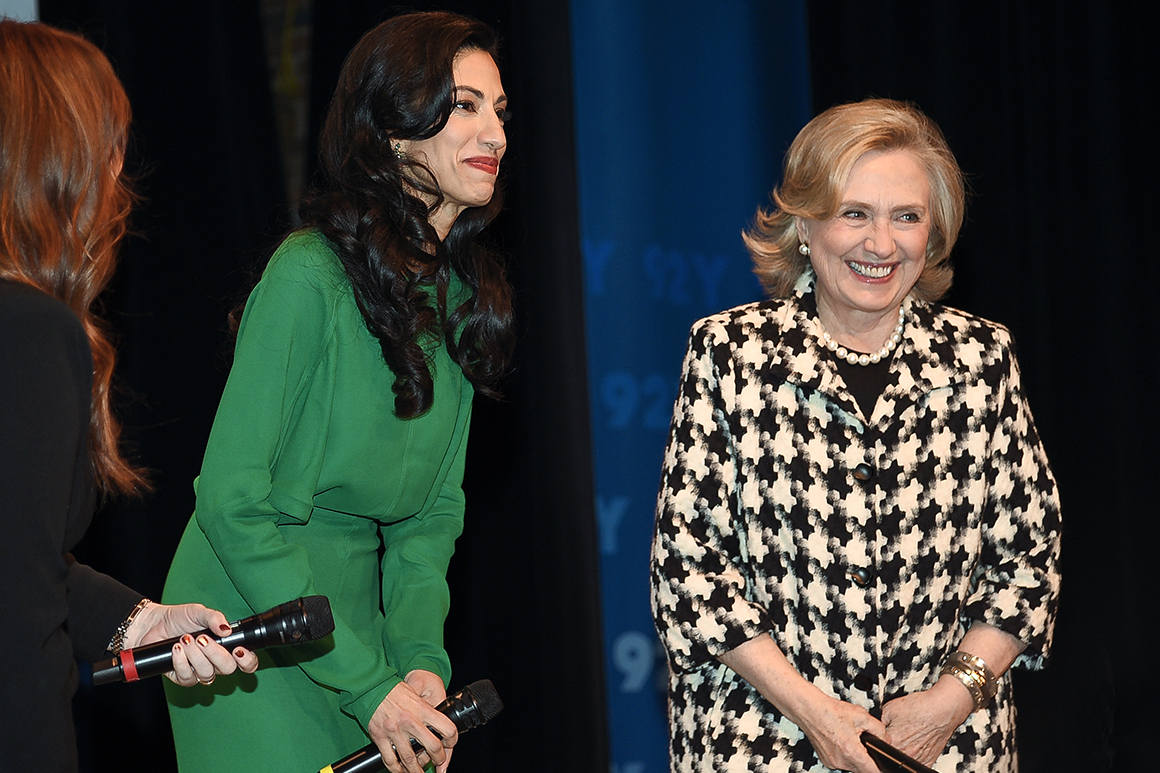
In one week, shepherded by a black SUV and a publicist from Scribner, she does CBS Sunday Morning, the Today Show, Morning Joe, Tamron Hall, Joy Reid, Stephen Colbert, The View. She talks to the Associated Press, USA Today, New York magazine, NPR, WAMU, BBC. She does live hits from her East Village apartment. She attends two book parties, one surrounded by celebrity friends at Anna Wintour’s townhouse. For the first time, on the sets of live tapings, she sees footage from the press conference where she stood by her husband in 2013, after his second scandal. “I’m doing the thing that scares me the most,” she says at one event, “which is this.”
In the book, there is constant attention paid to Abedin’s silence. “When I did speak out,” she writes, “it was more with a whisper than a megaphone.” She describes serving Clinton, that “brightest flame,” as like living in a “glass jar,” circling a person whose life “took precedence” over her own, she says. In one scene, before the 2013 press conference, her colleague Philippe Reines asks if she’s sure she wants to make a statement on camera: When he tells her, “This will be the first time most Americans will hear your voice,” he means it literally. During the waves of scandal, when Weiner’s political career collapsed after having sexual conversations with women he met online, including a 15-year-old girl, she saw a widening “chasm” between her own experience and the version she saw reflected in the eyes of reporters and photographers. “I defiantly stared right back,” she writes, but publicly, she said almost nothing. Backstage on her book tour, she is nervous and relieved, almost giddy to be talking. “I’ve never seen her this happy,” a former Clinton aide says in passing. The word Abedin uses is “unburdened.”
There’s pent-up demand to hear something from Clinton’s closest aide, but it’s not to ask about her childhood, or her travels at the State Department. As she presents herself to the public, almost every interview begins with the same question: Why did you feel the need to write this book? Abedin is being pressed for an explanation, though the ask is never made explicit. Why bring it all up again, they seem to say. The laptop, the emails, the betrayal, James Comey. Why write the book at all? Did people want an apology? A defense? A justification? And then comes the second question, the same one her boss got in 1998: Why did you stay with your husband?
The memoir offers 500 pages of answers — on every page, she tells us what she was feeling, when and why. “There’s been a lot of speculation over the last 15 years,” Abedin says. “What is wrong with her? What is she thinking? I tell you exactly what I am thinking in this book.” She details therapy sessions with her husband. She pulls from journal entries and letters. She accounts for the different stages of despair and self-doubt that haunted her marriage. The index entries for Weiner take up almost three pages. But she doesn’t sell outright scandal (her portrait of Weiner, a partner who was as much a source of happiness and financial stability as trauma and anger, doesn’t begin until you’re more than 200 pages in). She doesn’t give up scoops on Hillary and Bill Clinton (her publisher had to ask for a section on the impeachment). She details the unwanted advances of a male senator in the mid-aughts, but when pressed to name him, she refuses. She writes at length about her own silence, but the way in which that reflex to retreat might have been shaped by the Clintons’ own bunker mentality — always digging in rather than out in the face of scandal — is a parallel she examines without criticism or question. Abedin is finally talking, but as she explains her side of the story — “I realized that other people were writing my history,” she says — there’s a nagging sense that some find the answers unsatisfactory.
She discovered this early on, before the manuscript was done. For a while, the book’s working title was “Clarity.” The idea was scrapped, “because, to people on my editorial team, it wasn’t ‘clear.’ I’m not joking,” she tells me. “People who haven’t gone through what I have gone through, as it relates to my marriage and betrayal — they find so much of it confusing. Like, ‘But I don’t understand! Why did you stay?!’ ‘Why didn’t you leave?!’ ‘I don’t get it!’ ‘It’s not clear.’”
“It’s the way the senator story was covered, too,” she says. The memory of the incident, when an unnamed male senator tried to kiss her, only came back to her after the Brett Kavanaugh hearings. “This is more about having a discussion, knowing that it’s my truth, knowing that it was a trauma that was buried for 20 years!” she says. “Like, guess what? It’s not about him.”
Related posts:
Views: 0
 RSS Feed
RSS Feed

















 November 15th, 2021
November 15th, 2021  Awake Goy
Awake Goy  Posted in
Posted in  Tags:
Tags: 
















